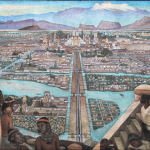A weaponized Bible is a dangerous thing. The biblical canon is a weapon of mass carnage, lopping heads and cutting people off at the knees.

The Church has ordained its biblical canon as ordnance throughout its history, leaving bloody corpses and lost souls in its wake. In the guise of “spiritual warfare,” Christians commit spiritual abuse when they use the Bible to beat people up. Presuming that God authored a book called The Holy Bible, they instruct people how they should behave, saying, “God’s Words says that you should…” The control and manipulation surrounding this book are amazing–especially considering that it’s not a book at all.
Who Wrote the Bible?
One person didn’t write the Bible. It was written by TONS of people over MANY centuries, in MULTIPLE countries and cultures. Scholars debate the authorship of many books that probably weren’t written by the people whose names the books bear as their titles. Contrary to popular belief, the Bible doesn’t claim to have God as its author. How could the Bible make such a claim since the Bible didn’t exist when the Bible was written? None of the biblical writers could have imagined what the Bible looks like today, and none of them claimed God was writing a book to be the ultimate authority for believers.
Compiled by Committees
When Christians refer to “The Bible,” we can’t even agree among ourselves what’s in the book. Roman Catholics have 73 books in their Bible, but Protestants only have 66. The Ethiopian Orthodox Tewahedo Church canon has 80 books. The various Bibles were compiled by committees that decided which books should be included or excluded. (And we all know, EVERYTHING is done best by committee!) “The Bible” in Jesus’ day was (roughly) what Christians call the Old Testament, but what is more respectfully called the Hebrew Scriptures. These were comprised of many separate scrolls and were not published as one book. So what changed, to create the current Bible?
A Rod for Control
For the first few centuries of Church history, it was fine for the Jesus movement called The Way to be loosey-goosey with its inspirational literature. Christian leaders circulated letters, many different gospels, and other writings that they found inspiring. But once the Church became institutionalized, these books had to be codified. Used as a tool of empire, a compiled and closed biblical canon could be a rod for control. Too many heretical groups had their own gospels and teachings. (Incidentally, the word “heresy” comes from the Greek word meaning “to choose.” So, heretics chose for themselves what to believe, instead of following an approved canon. These free-thinkers had to be stamped out, and a rod was just the tool to do it.
Church leaders debated which books should be included or excluded. Jewish leaders codified the Hebrew scriptures late in the first century at the Council of Jamnia. But it wasn’t until 367 that the Christian patriarch Athanasius of Alexandria wrote his Easter letter, listing out all 27 books of the New Testament as they are accepted today. He used the word “canon” or “rod” to describe this collection. So, the biblical canon was closed—at least until the Protestant Reformation when it would change again. Anti-Catholic leaders discarded what they deemed less divinely inspired and came up with their own Bible. Today, most Protestants receive their 66 books unquestioningly, without realizing that early Reformation leaders disagreed on what books should be included.
Which Bible Do They Mean?
This is why I chuckle when I hear Christians talking about a “biblical worldview,” or a “biblical mandate” for something. I wonder, which Bible do they mean? (And let’s not even get into issues of inspiration or mistakes in translation–those are separate issues entirely. Let’s stick to the issue of the canon.) “The Bible says it, I believe it, that settles it” assumes that there is one unified Bible with one consistent message. It forgets the diversity of literary genres, authors, and settings found in the scriptures. It ignores the fact that human copyists and committees compiled the Bible from the books that worked for them, to meet the religious or political needs of their day. Which Bible sits on your shelf may have more to do with your particular denomination than anything else.
Seven Qualifications
On his website, “Redeeming God: Liberating You From Bad Ideas About God,” Jeremy Myers gives seven qualifications or characteristics that committees required for books they included in the biblical canon. He writes:
- Apostolic – The book must be written by an apostle, or a ministry partner of one.
- Orthodox – The book must agree with the the accepted and approved teachings of the church.
- Christocentric – The book must focus on the person and work of Jesus Christ, especially in relation to His redemptive work on the cross for the world.
- Inspiration – The book must have the qualities and characteristics of the divinely inspired Word of God.
- Testimony of the Holy Spirit – The church authorities felt the inner witness of the Holy Spirit in helping them select certain books.
- Acceptance by the Church – The book must already be widely accepted and used by the majority of churches.
I Do What I’m Told
With these requisites in mind, the committees set to work compiling the Bible from favorite books from all the churches around the Roman Empire. Even if you believe in the verbal inspiration and inerrancy of scripture, you’ve got to admit that the process of canonization leaves a lot of room for mistakes. Unless, of course, you believe that the canonization process was just as inspired as the writing. But this is problematic because the Bible never claims this for itself. So, this leaves us with the stance of, “I accept the Bible as I have received it because I choose to do so. I accept the Catholic Bible because I’m Catholic, or the Protestant Bible because I’m Protestant.” In other words, “I do what I’m told.” The Bible is what it is, not because God said so, but because the Church said so.
Picking and Choosing Scriptures
Don’t get me wrong–I’m not anti-scripture. The Bible is my favorite book if you can call it a book. But when someone declares that I’m “picking and choosing” which passages I like and which ones I want to ignore, I say, “Exactly! And so do you! And so did the people who gave us the Bible in the first place!” We choose what speaks to us, what inspires us, what works for us—just like believers have done since the dawn of Christianity!
Sola Scriptura
Protestantism’s famous “Sola Scriptura” (Only Scripture) as a mandate for relying exclusively on the Bible for infallible authority is ironic because it’s not biblical. Nowhere does the Bible claim itself as the only authority, and nowhere does it claim that there’s a closed biblical canon. Even the oft-quoted curse at the end of the book of Revelation (Revelation 22:3) refers only to those who add or subtract from John’s Apocalypse, not from the Bible as a whole– because the Bible didn’t exist at the time!
A Measuring Stick of Differing Units
A closed canon is unbiblical. Sola Scriptura is unbiblical. If you’re looking for a measuring stick with one common unit of measure, you won’t find one. Instead, we find women and men of faith, living out their relationship with God. Far from representing one homogenous people or a unified Bible, the scriptures depict various viewpoints and perspectives from a collection of amazing literature, disagreeing on many points yet communicating a common desire for God. Sort of like one of those measuring sticks that have inches on one side, centimeters on another side, and maybe cubits on the flip side—the Bible does not represent one single unit of measure. Yet all those units point to the same length—God. And it’s the diversity of voices pointing to the same length, that makes it beautiful.
The Bible as a Weapon
Still, the Bible as a measuring rod is problematic—especially when so many adults remember being beaten by yardsticks as kids. In the same way, Christians use the Bible as a weapon to measure other people, to judge and condemn. We use the canon (and the human notion of a closed canon) to prove that we are right, and they are wrong. And with biblical canons used in that way, they become weapons of mass carnage. As Beth Moore once tweeted: “When the gospel has become bad news to the poor, to the oppressed, to the broken-hearted and imprisoned and good news to the proud, self-righteous and privileged instead, it is no longer the gospel of our Lord Jesus Christ.” When we use the Bible as a weapon, then the canon becomes a deadly thing instead of an instrument of peace.
God Is Still Speaking
Further, the notion of a closed canon suggests that God no longer speaks through prophetic voices today. Of course, the original compilers had their reasons, for not wanting Christianity to embrace any and all inspirational literature, willy-nilly. But what if the Church considered the last five criteria listed above for sacred literature, without requiring the first? We would realize that God continues to speak, inspiring authors such as John Bunyan, CS Lewis, Wm. Paul Young, and Richard Rohr. Perhaps we would listen more carefully to the voice of God, who still speaks to us in a still, small voice. You might even consider that your voice might be the next John, Timothy, or Luke.
From a Weapon to an Instrument of Peace
And why not? The made-up doctrine of infallible scripture prevents people from considering the part that they might play in inspiring a new generation of Christians. With infallibility as a standard, can modern believers truly feel that they have any part to play in sharing new ideas about God? With a closed biblical canon, we stifle theological innovation. When the Bible booms so loudly that it drowns out new prophetic voices, then the Church shoots itself with its canon.
The biblical canon becomes not only an instrument of destruction for those outside the church but a weapon that cuts the Church off at the knees. Let’s try holding the books and teachings of the Bible dearly but loosely and forget about something called a canon. Instead of a weapon of warfare, how about making our scriptures into an instrument of peace?

















